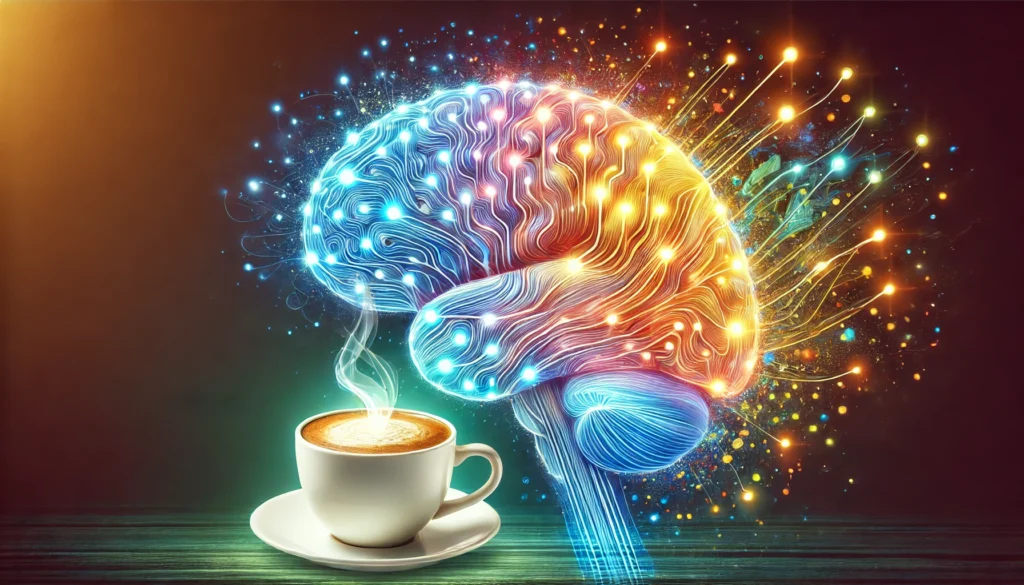Caffeine is often the go-to pick-me-up for many seeking that extra boost of alertness and focus. Yet, for individuals with Attention Deficit Hyperactivity Disorder (ADHD), caffeine’s effects can be perplexing. Instead of the expected jolt of energy, some with ADHD report feeling tired or sleepy after consuming caffeine. This article delves into the nuanced relationship between caffeine and ADHD, particularly focusing on its impact on sleep.
You may also like: Enhancing Concentration: Strategies for ADHD
Understanding ADHD and Caffeine
To comprehend caffeine’s role in the life of someone with ADHD, it’s crucial to understand ADHD itself. ADHD is a neurodevelopmental disorder characterized by symptoms such as inattention, hyperactivity, and impulsivity. The condition affects both children and adults, and its management often involves medications, behavioral therapies, and lifestyle modifications.
ADHD: A Multifaceted Disorder
ADHD is not just about hyperactivity or inattentiveness; it’s a complex interplay of various symptoms that can manifest differently from person to person. Some individuals may primarily struggle with inattention, while others may experience more pronounced hyperactivity or impulsivity. The variability in symptoms makes personalized management plans essential for effective treatment.
The Role of Neurotransmitters in ADHD
Central to ADHD’s complexity is the role of neurotransmitters like dopamine and norepinephrine. These brain chemicals are crucial for transmitting signals related to attention and focus. In individuals with ADHD, there is often a deficiency or imbalance in these neurotransmitters, which contributes to the disorder’s symptoms. Understanding how different treatments, including caffeine, can affect these neurotransmitters is key to managing ADHD.
Lifestyle Modifications as a Management Tool
Beyond medications, lifestyle modifications play a significant role in managing ADHD. These may include structured routines, behavioral interventions, and dietary considerations. Caffeine, as a stimulant, is often considered in this context, as it can influence energy levels and focus. However, its impact is not uniform, particularly in those with ADHD, underscoring the importance of individualized approaches.
Caffeine: A Double-Edged Sword
Caffeine, a central nervous system stimulant, is known for enhancing alertness and temporarily warding off drowsiness. For the general population, caffeine consumption often leads to increased focus and energy. However, for those with ADHD, the reaction can vary significantly. Some individuals might experience the opposite effect, feeling tired or even more distracted after consuming caffeine.
The Stimulant Paradox
While caffeine is universally recognized as a stimulant, its effects can paradoxically induce fatigue in some individuals, especially those with ADHD. This paradox may stem from the way caffeine interacts with the unique neurochemical landscapes of those with ADHD. For some, caffeine might not provide enough stimulation to counteract their inherent dopamine dysregulation, resulting in unexpected lethargy.
Individual Variability in Caffeine Response
Caffeine’s impact is highly individualized, and factors such as genetic makeup, existing medication regimens, and overall health can influence how a person with ADHD responds to it. While some might find caffeine beneficial in enhancing focus, others may experience heightened distractibility or irritability. Understanding this variability is crucial for those with ADHD in managing their caffeine intake effectively.
Caffeine Tolerance and Dependency
Regular consumption of caffeine can lead to tolerance, where the initial effects diminish over time, prompting increased intake to achieve the same level of alertness. For individuals with ADHD, this can complicate their ability to manage symptoms, as fluctuating caffeine levels may exacerbate inconsistencies in attention and focus. The potential for dependency also necessitates careful monitoring of caffeine consumption patterns.

The Science Behind Caffeine and ADHD
The relationship between caffeine and ADHD is not entirely understood, but it is believed that caffeine impacts neurotransmitter activity in the brain, particularly involving dopamine—a neurotransmitter that plays a key role in attention and focus.
Dopamine Dysregulation in ADHD
People with ADHD often have disrupted dopamine pathways, which contribute to their symptoms. Stimulant medications prescribed for ADHD, such as methylphenidate and amphetamines, function by increasing dopamine levels in the brain, thereby improving attention and reducing hyperactivity.
The Impact of Stimulant Medications
Stimulant medications work by enhancing dopamine transmission, providing a more stable neurochemical environment that aids in attention and focus. For those with ADHD, these medications can be life-changing, allowing for better management of daily tasks and responsibilities. However, they also highlight the delicate balance required in managing ADHD, as even small changes in medication or lifestyle can significantly impact symptoms.
Caffeine’s Modest Influence on Dopamine
Caffeine also influences dopamine levels, albeit in a milder way. This interaction can lead to different outcomes in individuals with ADHD. For some, caffeine might provide a mild stimulant effect similar to ADHD medications, while for others, it might not be sufficient to overcome dopamine dysregulation, leading to fatigue instead.
Comparing Caffeine to ADHD Medications
While both caffeine and ADHD medications act as stimulants, they do so through different mechanisms and with varying intensities. ADHD medications are specifically designed to target the neurochemical deficiencies in ADHD, whereas caffeine’s effects are more generalized. This distinction can help explain why caffeine’s impact on those with ADHD can be unpredictable and why it might not substitute for prescribed treatments.
Caffeine and Sleep Patterns in ADHD
Sleep disturbances are common among individuals with ADHD. The disorder itself can lead to difficulties in falling asleep, staying asleep, or waking up feeling refreshed. Introducing caffeine into the mix can further complicate sleep patterns.
ADHD-Related Sleep Challenges
Individuals with ADHD often face unique sleep challenges, including difficulty maintaining regular sleep schedules, increased restlessness, and a propensity for late-night wakefulness. These sleep disturbances can exacerbate ADHD symptoms, creating a cycle of fatigue and inattentiveness that is difficult to break. Understanding these patterns is essential for managing both ADHD and its related sleep issues.
The Influence of Caffeine on Sleep Architecture
Caffeine can alter sleep architecture, the structure of the different sleep cycles, by reducing the amount of deep sleep and prolonging the time it takes to fall asleep. For someone with ADHD, who may already struggle with sleep, caffeine’s impact can be particularly disruptive, leading to further sleep deprivation and exacerbation of ADHD symptoms.
Circadian Rhythms and ADHD
Circadian rhythms, which govern our natural sleep-wake cycles, can be irregular in individuals with ADHD. This dysregulation can make it challenging for them to adhere to conventional sleep patterns, and caffeine consumption can further disrupt these rhythms. Understanding the interplay between circadian rhythms and caffeine can aid in developing more effective sleep management strategies for those with ADHD.
Caffeine-Induced Sleepiness
Paradoxically, caffeine might induce sleepiness in some people with ADHD. This phenomenon, although not fully understood, could be attributed to caffeine’s impact on individual brain chemistry. The stimulant effect might be counterbalanced by a person’s unique neurological makeup, leading to an unexpected increase in drowsiness.
The Neurological Basis of Caffeine-Induced Sleepiness
The paradox of caffeine-induced sleepiness may be tied to its interaction with adenosine receptors in the brain. While caffeine typically blocks these receptors to promote wakefulness, in some individuals, particularly those with ADHD, this interaction might trigger compensatory mechanisms that lead to increased sleepiness instead.
Genetic Factors Influencing Caffeine Response
Genetic differences can play a significant role in how individuals with ADHD metabolize and respond to caffeine. Variations in genes related to caffeine metabolism and dopamine regulation might explain why some people experience heightened drowsiness rather than alertness after consuming caffeine, highlighting the need for personalized approaches in managing caffeine intake.
Psychological and Environmental Influences
Beyond genetics, psychological factors such as stress levels and environmental conditions can also influence caffeine’s effects on sleepiness. For those with ADHD, heightened stress or an overstimulating environment might exacerbate caffeine’s paradoxical effects, underscoring the importance of a holistic approach to managing ADHD and caffeine consumption.
The Role of Chronotype
Chronotype, which refers to an individual’s natural sleep-wake cycle, might also play a role. Some people with ADHD are naturally inclined towards being night owls, making them more susceptible to caffeine’s paradoxical effects.
Understanding Chronotypes and Their Variations
Chronotypes determine whether an individual is naturally predisposed to be an early riser or a night owl. In the context of ADHD, these natural inclinations can influence how caffeine affects sleep patterns, as night owls may find caffeine more disruptive to their already delayed sleep schedules.
The Interaction Between Chronotype and ADHD Symptoms
For individuals with ADHD, being a night owl can exacerbate challenges related to attention and focus, particularly in environments that demand early morning alertness. Caffeine consumption, intended to mitigate these challenges, might instead interfere with natural circadian rhythms, leading to increased difficulties in maintaining a consistent sleep-wake cycle.
Tailoring Caffeine Use to Chronotype
Recognizing one’s chronotype can aid in developing more effective caffeine consumption strategies. For night owls with ADHD, limiting caffeine intake to earlier in the day and avoiding it in the late afternoon or evening might help align caffeine’s stimulating effects with their natural sleep-wake tendencies, minimizing disruptions to sleep.

Practical Implications: Managing Caffeine Intake
For individuals with ADHD, understanding and managing caffeine consumption is crucial.
Assessing Individual Responses
It’s important to recognize that caffeine affects everyone differently. Individuals with ADHD should closely monitor their response to caffeine, noting any changes in focus, energy levels, or sleep quality. Keeping a journal can be a helpful tool in identifying patterns and making informed decisions about caffeine intake.
The Benefits of Self-Monitoring
Self-monitoring involves tracking caffeine intake alongside attention, mood, and sleep patterns. This practice enables individuals with ADHD to identify specific triggers and assess how caffeine impacts their daily functioning. Over time, this data can inform adjustments in caffeine consumption to optimize its benefits while minimizing adverse effects.
Journaling for Insight
A detailed journal can serve as a valuable resource for identifying trends and making connections between caffeine intake and ADHD symptoms. Individuals can record not only their caffeine consumption but also their emotional and cognitive states, providing a comprehensive view that aids in tailoring caffeine use to their unique needs.
Collaborating with Healthcare Providers
Working with healthcare providers to understand caffeine’s role in ADHD management can lead to more effective strategies. Professionals can offer guidance based on the latest research and individual health considerations, helping to align caffeine consumption with broader treatment goals.
Timing and Dosage Considerations
For those who find caffeine beneficial, timing and dosage are key. Consuming caffeine earlier in the day may prevent interference with sleep. Additionally, opting for smaller, more frequent doses rather than a large amount at once might help maintain a balanced effect.
Optimizing Timing for Maximum Benefit
Timing caffeine consumption to align with natural energy dips can maximize its alertness-enhancing effects. For individuals with ADHD, this might mean having caffeine mid-morning when focus typically wanes, while avoiding it later in the day to preserve sleep quality.
Determining the Right Dosage
Finding the optimal caffeine dosage is a process of trial and error, as individual tolerance levels vary widely. Starting with small amounts and gradually adjusting based on response can help individuals with ADHD fine-tune their caffeine intake to achieve desired effects without overstimulation.
Avoiding Late-Day Caffeine
Steering clear of caffeine in the late afternoon and evening is crucial for those with ADHD to prevent sleep disruptions. By establishing a caffeine cut-off time, individuals can ensure that the stimulant’s effects diminish well before bedtime, supporting more restful sleep.
Alternatives to Caffeine
If caffeine proves more hindrance than help, exploring alternative strategies to boost focus and energy is advisable. These might include:
- Physical Activity: Regular exercise can enhance mood and improve concentration.
- Dietary Adjustments: Ensuring a balanced diet rich in omega-3 fatty acids, proteins, and whole grains can support brain health.
- Mindfulness Practices: Techniques such as meditation and yoga can aid in managing ADHD symptoms by promoting calmness and focus.
Exploring Physical Activity as a Stimulant Alternative
Engaging in regular physical activity can naturally boost energy and focus by increasing endorphin levels and enhancing overall brain function. For individuals with ADHD, incorporating exercise into daily routines can provide a non-caffeinated means of improving concentration and mood.
Nutritional Strategies for Brain Health
A diet rich in nutrients essential for brain health can support cognitive function and mitigate ADHD symptoms. Omega-3 fatty acids, found in fish and flaxseeds, along with proteins and whole grains, can stabilize energy levels and support neurotransmitter production, offering a dietary approach to enhancing focus.
Mindfulness and Relaxation Techniques
Practices such as meditation, yoga, and deep breathing exercises can help manage ADHD symptoms by promoting relaxation and mental clarity. These mindfulness techniques can serve as effective alternatives to caffeine, providing a means of achieving calm and focus without the risk of overstimulation.

The Broader Context: ADHD and Lifestyle
Understanding the caffeine-ADHD relationship offers a glimpse into the broader lifestyle considerations for managing ADHD. It’s crucial to adopt a holistic approach that includes medication, therapy, and lifestyle modifications for optimal management of the disorder.
Integrating Lifestyle Modifications with Treatment
Lifestyle modifications are a crucial component of comprehensive ADHD management, complementing pharmacological and therapeutic interventions. By integrating strategies such as structured routines, balanced nutrition, and regular physical activity, individuals with ADHD can enhance their overall well-being and symptom management.
The Evolving Landscape of ADHD Research
The exploration of caffeine’s impact on ADHD is ongoing. As research advances, we may uncover new insights into how caffeine and other dietary components influence ADHD symptoms. In the meantime, individuals with ADHD are encouraged to stay informed and work closely with healthcare professionals to tailor their management strategies.
Holistic Approaches to ADHD Management
A holistic approach to ADHD management involves considering the interplay between various lifestyle factors and their collective impact on symptoms. By addressing nutrition, sleep, exercise, and stress management, individuals with ADHD can develop a well-rounded plan that supports optimal functioning and reduces reliance on stimulants like caffeine.
Conclusion
The question of whether caffeine helps or hinders ADHD sleep does not have a one-size-fits-all answer. While caffeine can provide a much-needed boost for some, it might lead to unexpected drowsiness in others. The key lies in understanding one’s unique response to caffeine and making informed choices that align with personal health and wellness goals. As we continue to unravel the complexities of ADHD and its interaction with caffeine, embracing a personalized approach to lifestyle and dietary choices remains paramount.
Personalization as a Pathway to Success
Recognizing individual differences in caffeine response is crucial for those with ADHD. By personalizing caffeine consumption and exploring alternative strategies, individuals can tailor their approach to ADHD management, optimizing focus and energy levels while minimizing negative impacts on sleep.
Continuing the Conversation
As research into ADHD and caffeine continues to evolve, staying informed about the latest findings and recommendations is essential. Engaging in discussions with healthcare providers and peers can provide valuable insights and support, empowering individuals with ADHD to make informed decisions about their caffeine use.
Embracing Flexibility in ADHD Management
Flexibility is key in managing ADHD, as individuals may need to adjust their strategies in response to changing circumstances and new information. By remaining open to experimentation and adaptation, those with ADHD can find the right balance in their caffeine consumption and broader lifestyle choices, supporting overall health and well-being.
Further Reading:
Does Caffeine Help ADHD or Make It Worse?
Why Does Coffee Make Me Sleepy: ADHD & Caffeine
Why Does Coffee Make Me Sleepy: ADHD & Caffeine
Important Note: The information contained in this article is for general informational purposes only, and should not be construed as health or medical advice, nor is it intended to diagnose, prevent, treat, or cure any disease or health condition. Before embarking on any diet, fitness regimen, or program of nutritional supplementation, it is advisable to consult your healthcare professional in order to determine its safety and probable efficacy in terms of your individual state of health.
Regarding Nutritional Supplements Or Other Non-Prescription Health Products: If any nutritional supplements or other non-prescription health products are mentioned in the foregoing article, any claims or statements made about them have not been evaluated by the U.S. Food and Drug Administration, and such nutritional supplements or other health products are not intended to diagnose, treat, cure, or prevent any disease.


